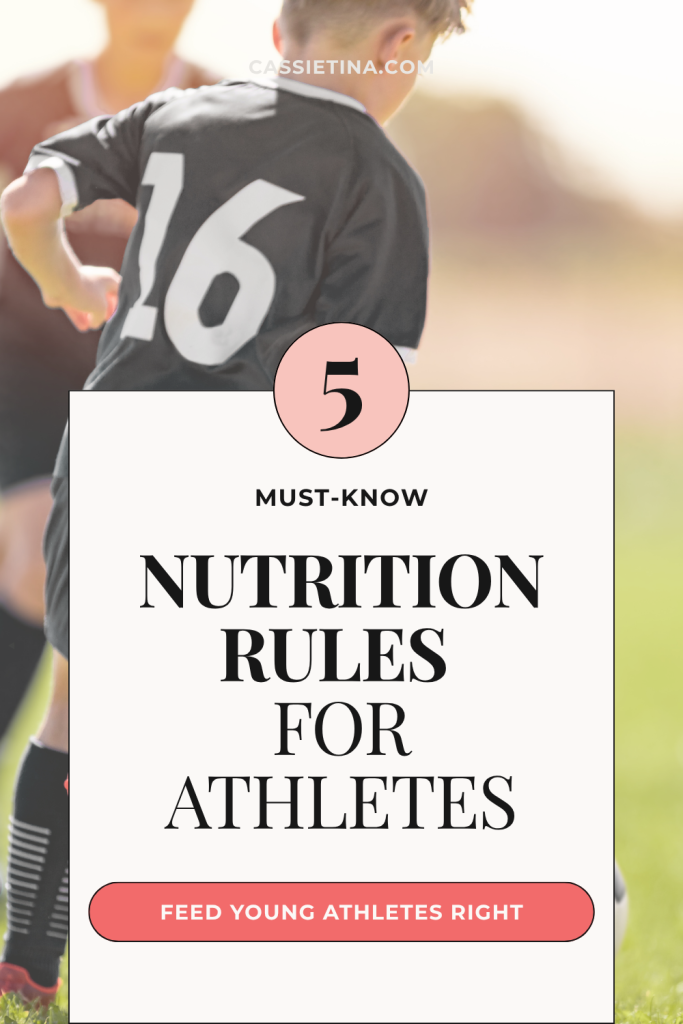Your kid is sprinting, sweating, and burning through energy like a furnace… and dinner is a granola bar and string cheese in the backseat?
Yeah. Same.
Being a sports mom during a busy season often feels like you’re one forgotten water bottle away from a meltdown…yours or theirs. You’re juggling carpools, cleats, homework, and game schedules, and somehow still expected to feed your kid something besides goldfish crackers and gas station snacks.
Here’s the deal: most young athletes are under-fueled. Not because we’re bad parents, but because we’re under-informed and overwhelmed. The typical on-the-go food options are high in calories but low in the stuff our kids actually need: protein, quality carbs, healthy fats, and micronutrients.
Let’s clear up the confusion and get back to the basics: the nutrition essentials for young athletes that actually support their energy, focus, and growth.
So let’s fix that without complicated tracking, crazy expensive foods, or Pinterest-worthy lunchboxes.
Here are the 5 nutrition essentials for young athletes to perform, recover, and feel their best.
1. Hydration Matters More Than You Think
Even just a 1–2% drop in hydration can tank performance. That’s right! One missed water bottle can mean slower reaction times, foggy thinking, and higher injury risk.
Here’s what happens: they sweat (awesome), lose water and electrolytes (less awesome), and forget to replace it all (not great).
1. Hydration Made Simple:
- One bottle during practice
- One bottle after practice
- A glass of water with every meal
Throw in at least one drink per day with 300–500mg of sodium to help replace lost electrolytes. Think Powerade, Gatorade, LMNT, or even a pinch of salt in watered-down juice if you’re DIY-ing it.
Quick tip: Teach them the urine color check. (Yes, they will absolutely report on it every time they pee. You’ve been warned.)
2. Protein = Repair & Strength
Kids in sports aren’t just burning energy, they’re building bodies. That means muscles, bones, and tissues all need to recover after hard practices and games.
Enter protein. It’s essential for muscle repair, immune function, and helping your kid feel full between meals.
Visual rule:
Palm-sized portion of protein at every meal. Their palm = their portion.
Easy protein wins:
- Chicken or turkey
- Eggs
- Greek yogurt
- Tofu or tempeh
- Beans or lentils
Picky eater tip:
Get sneaky. Blend it (smoothies with Greek yogurt), dip it (hummus or cottage cheese), or swap it (protein-packed pancakes or pasta).
3. Carbs Are Fuel, Not the Enemy
Somewhere along the way, carbs got a bad rep. But for youth athletes, carbs are essential, not optional.
Carbohydrates provide the fast-acting energy muscles and brains run on. Without enough, they’ll fizzle out halfway through a game or practice. Bonus: post-practice carbs + protein = faster recovery.
How much?
3–5 cupped handfuls of carbs a day depending on their sport, age, and training schedule.
Kid-approved carb ideas:
- Oatmeal
- Rice or potatoes
- Pasta
- Whole grain toast or waffles
- Bananas or applesauce pouches
🚫 Just go easy on high-fiber carbs right before a workout—fiber slows digestion and can cause mid-practice tummy trouble.
4. Fats Support Hormones, Growth & Immunity
Not all fats are created equal…and kids need the right kinds. Healthy fats are crucial for long-lasting energy, especially during endurance sports. They also help regulate hormones, support brain development, and boost immunity.
The wrong kinds (fried snacks, ultra-processed oils)? They do the opposite, leading to sluggishness, inflammation, and long-term health concerns.
Rule of thumb:
Literally. A thumb-sized portion of healthy fats at each meal is enough.
Smart fat sources:
- Avocado slices
- Drizzle of olive oil
- Nut butters
- Chia or flax seeds
🥑 Pro tip: Save the higher-fat meals for at least 2–3 hours before practice— they take longer to digest and can cause GI distress if eaten too close to game time.
5. Color = Micronutrient Power
Fruits and veggies may not be as “fun” as protein bars, but they’re the unsung heroes of youth athlete nutrition. The vitamins, minerals, and antioxidants in colorful produce help with recovery, focus, immune strength, and injury prevention.
The goal:
1–2 fistfuls of fruit or veg per meal.
Make it fun:
- Ask, “How many colors are on your plate?” (The goal: 5)
- Grocery store game: Pick a color of the week and challenge your kid to find a fruit or veggie that matches.
🌈 Red peppers, blueberries, carrots, spinach—each one brings something unique to the table (and their body).
Final Thoughts: You’ve Got This, Mom
You don’t need a nutrition degree or fancy tracking app, just these 5 nutrition essentials for young athletes, done consistently.
Hydration. Protein. Carbs. Healthy fats. Colorful produce.
They’re simple to remember, easy to implement, and powerful enough to support your kid from warm-up to cool-down.
From one sports mom to another: fueling your kid well doesn’t mean more stress. It means fewer breakdowns, better performance, and (hopefully) a little less hanger in your minivan.
🎯 Want help putting it all together?
Download your FREE Sports Season Survival Guide — it includes 3 prep-ahead dinners, a snack list for game days, and a grocery list that keeps your athlete fueled all week long.
👉 Grab it here


